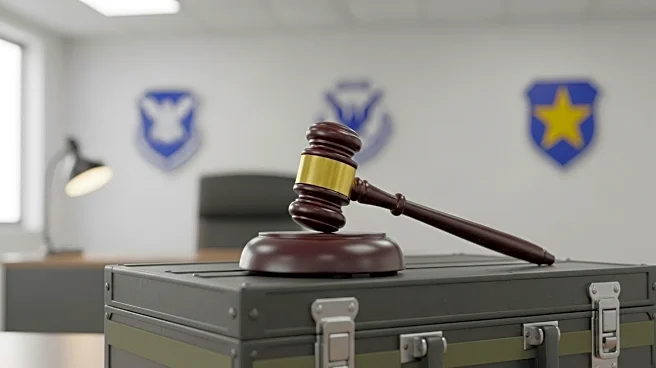What is the story about?
What's Happening?
National-security-law experts have raised concerns that the Trump administration is disregarding guidance from the military's top legal advisors, known as judge advocates general (JAGs), in its operations against alleged drug cartels and deployments of National Guard troops to U.S. cities. James Baker, a law professor and former chief judge of the U.S. Court of Appeals for the Armed Forces, suggested that the administration might be seeking to override JAG advice through the Department of Justice's Office of Legal Counsel. This follows the dismissal of top JAGs from the Air Force, Army, and Navy by Defense Secretary Pete Hegseth, who cited the need to remove 'roadblocks' to orders from the commander in chief. The administration has classified certain cartels as terrorist organizations and declared an 'armed conflict' with them, a move criticized by Baker for lacking sufficient justification. Additionally, legal challenges have emerged in response to National Guard deployments in cities like Chicago and Portland.
Why It's Important?
The potential sidelining of military legal advice by the Trump administration could have significant implications for U.S. military operations and civil-military relations. JAGs play a crucial role in ensuring that military actions comply with legal standards, and their advice is vital for maintaining the integrity of military operations. Ignoring this advice could lead to unlawful actions, undermining the rule of law and potentially exposing military personnel to legal risks. The administration's approach may also strain relationships between civilian leadership and military commanders, who are expected to disobey unlawful orders under the Uniform Code of Military Justice. This situation highlights the tension between political directives and legal constraints, with potential consequences for U.S. domestic and international policy.
What's Next?
The ongoing legal challenges against the Trump administration's actions could lead to court rulings that clarify the limits of executive power in military operations. If the courts find the administration's actions unlawful, it may result in policy reversals or changes in how military operations are conducted. Military commanders may face increased pressure to assert their legal obligations, potentially leading to more public disputes between military and civilian leaders. The administration's legal strategies and justifications will likely be scrutinized, influencing future decisions on military deployments and operations against non-state actors.
Beyond the Headlines
The situation raises broader questions about the balance of power between the executive branch and military legal advisors. It underscores the importance of maintaining checks and balances within the government, particularly in areas involving national security and military operations. The ethical implications of overriding legal advice could affect the perception of U.S. military actions globally, impacting diplomatic relations and the country's moral standing. Long-term, this could lead to shifts in how military legal advice is integrated into decision-making processes, potentially prompting reforms to safeguard the independence and authority of military legal advisors.
















